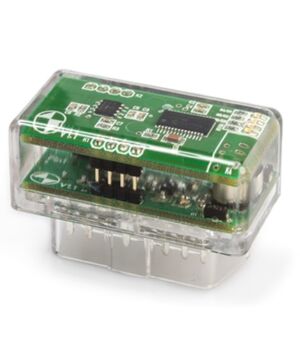- You do not have any products in your shopping cart yet.
✔ Adaptable
The new OBD Killer learns the error codes that have been entered and is therefore suitable for all sporadic errors related to exhaust emissions.

The new OBD Killer learns the error codes that have been entered and is therefore suitable for all sporadic errors related to exhaust emissions.
While driving, the engine control unit is monitored in real time for sporadic errors.
Pending error codes are blocked before an error message is even entered.
For almost all vehicles from 2008 onwards. The OBD killer is simply plugged into the diagnostic port.
"OBD" stands for "On-Board Diagnostics," the standardized diagnostic interface for motor vehicles. The OBD killer is a compact electronic module that is simply plugged into this diagnostic interface. There, it monitors the engine control unit's error memory in real time for possible entries. If an impending error is detected in the memory, the OBD killer blocks it before the driver sees a message in the cockpit.
The OBD Killer constantly monitors the error memory of the engine control unit. As soon as an error occurs, the OBD Killer intervenes immediately. It removes the pending error message before it is entered into the actual error memory. If an error code has already been entered before the OBD Killer is used, it is also removed.
You can use the OBD killer on all vehicles from model year 2008 onwards. There are also vehicles that already support the necessary standard from previous years. You can recognize these vehicles by the fact that pins 6 and 14 are occupied on the diagnostic connector. It does not matter whether the engine runs on diesel, gasoline, natural gas, or LPG. Some engine control units do not support the deletion of error codes while driving. The OBD killer is not suitable for these vehicles.
The OBD killer is adaptive and can generally block all exhaust-related error codes. During installation, the OBD killer learns the entered codes as expected errors. This process can be repeated as often as desired. One of the most common errors, for example, is code P0401 in connection with coked EGR valves. However, error code P0420 also occurs very frequently, e.g., in aged catalytic converters. Manufacturer-specific codes that do not comply with the OBD standard are also deleted. As soon as an unexpected error occurs, the OBD Killer no longer intervenes. This means that the full functionality of the error memory and engine warning light is retained for all other error messages.
The OBD killer is ideal for all sporadic exhaust-related errors such as P0400, P0401, P0402, P0403, P0404, P0405, P0406, P0407, P0408 (exhaust gas recirculation). The error class of the catalytic converter (P0420, P0421, P0422, P0423, P0424, P0430, P0431, P0432, P0433, P0434) is different. In the event of performance increases or unexplained turbocharger problems, error code P0234 often occurs: boost pressure control limit exceeded. It can also be used in motorsports, for example, if the OPF/GPF is to be removed (OPF/GPF delete).
When changing vehicles, you can continue to use the OBD killer for all vehicles built after 2008 without any problems. If the OBD killer detects a new chassis number after installation, all learning values are reset. The OBD killer is then virtually brand new.
No. The OBD killer should only be used if a repair has not been able to fix the problem or no fault can be found. Instead of replacing all parts again, the OBD killer is the better solution for your wallet and conserves environmental resources.
Interceptrecurring DTCs (e.g., P0420/P0430/P0401) – genuine new errors remain visible.
Plug into the OBD port – no conversion, no app. Ready for immediate use.
Current errors are stored as "expected" and selectively filtered when they recur.
Unknown/new errors occur deliberately – relevant information remains visible.
For many OBD-II/CAN vehicles. New VIN detected? Device resets automatically.
Sensitive to aging & setup changes.
P0420 (Bank 1), P0430 (Bank 2), related codes P0421–P0434.
Sporadic feedback despite repair/cleaning.
P0400–P0408 (e.g., P0401 "Flow too low").
Short-term control deviations during performance interventions.
P0234, among others.
Also manufacturer-specific codes – unknowns remain visible.
{{.}}
{{/content}}{{{.}}}
{{/content}}